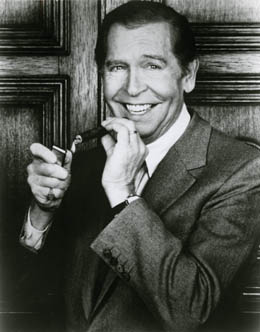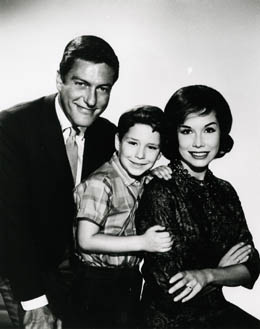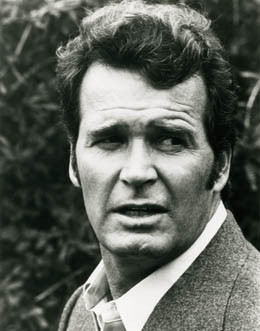
Emmy®: Stellar at 61
As we celebrate Emmy's 61st anniversary in 2009, journey through some milestone moments in Primetime Emmy Awards history.
There may have been a couple of no-shows at the first Emmy Awards, held on January 25, 1949 - radio star Walter O'Keefe had to step in to perform when singer Rudy Vallee was called out of town, and Television Academy president Edgar Bergen was also absent, summoned to the White House to attend the inaugural festivities of President Harry Truman - but the event nonetheless made history.
It brought together some 600 guests to honor outstanding efforts in the field of television - puppeteer Shirley Dinsdale and her puppet sidekick, Judy Splinters, received the very first Emmy Award, for Most Outstanding Television Personality.
It may have been a humble beginning, but it was the start of an awards event that, today, is unmatched in the world of television. Now in 2009, as the Academy of Television Arts & Sciences celebrates the 61st anniversary of the Primetime Emmy Awards, let's take a moment to look back at some special moments in Emmy history.
1940s
1946 - There are 6,000 television sets sold in the United States. Syd Cassyd, a television columnist, sees the potential of the new medium and proposes the start of an organization that would "promote the cultural, educational and research aims of television." The Academy of Television Arts & Sciences is created and ventriloquist Edgar Bergen is elected the organization's first president.
1948 - The first Emmy Awards are chosen. The honors are initially called Immys, after a term used for the image orthicon camera, but Harry Lubcke, president of the Society of Television Engineers, offers up a feminization of the term. The design for the statue is by Louis McManus, an engineer at Culver City's Cascade Pictures. He admits that his wife, Dorothy, was the model for the wing-tipped woman holding up a symbol for the electron.
The awards are held at the Hollywood Athletic Club. Puppeteer Shirley Dinsdale is given the Outstanding Personality Award.

1949 - Milton Berle (pictured at right), Ed Wynn and the Texaco Star Theater are the big winners of the night. The Life of Riley is given the trophy for Best Film Made for and Viewed on Television.
Reflecting on his win as Most Outstanding Kinescope Personality, Berle says the honor gave him his first taste of national recognition. "It gave me a bravado about myself and gave me a lot of ego," he said years later. But Kinescope? "I have the plaque at home... And it says Kinescope. I look at it and say, 'My God! Methuselah's day.' But it meant a lot to me."
1950s
1954 - Danny Thomas picks up awards for Best Situation Comedy and Best Actor in a Regular Series for Make Room For Daddy, while Art Carney and Audrey Meadows take home statuettes for their work on The Jackie Gleason Show. Franklin Schaffner and Reginald Rose win best director and writer Emmys, respectively, for Studio One's presentation of Twelve Angry Men. Rose says he got the idea for Men one day while serving on a jury. "I was on a manslaughter case. It was stunning. In the jury room we deliberated for about five hours. There was a terrific fight, and the side I was on prevailed."
1955 - Phil Silvers takes trophies for Best Comedy Series and Best Actor in a Continuing Series for The Phil Silvers Show, while newsman Edward R. Murrow receives an Emmy as Best News Commentator. Bob Finkel, who directed the first several Emmy telecasts, recalls the difficulties of producing a live, 90-minute show (it was broadcast that year on NBC and received nearly a 30 share). "Not only were you doing a live show, but you were doing one that hadn't been rehearsed. The crew was nervous. The producer was nervous...the performers. So I decided in order to relieve the tension among my crew, I would come to the taping in a suit with a tie. And it had a very calming effect."
1957 - Gunsmoke is the Best Drama Series for the year, while Robert Young and Jane Wyatt each take home awards for lead actor and actress in Father Knows Best. Jack Benny is honored with the Trustees Award and also wins the Emmy Award with possibly the longest name: Best Continuing Performance in a Series by a Man Who Essentially Plays Himself. Upon accepting his Trustees Award, Benny tells the audience, "I have an eerie feeling you want me to retire, but I'm not going to quit until I'm 50, and then I'll have to because I'll be 80!"
1960s
1960 - The Untouchables takes home four statuettes including one for star Robert Stack. The night's breakout star, though, is an unknown comic who fills in at the last minute on the awards broadcast after Mike Nichols and Elaine May walk off when a sponsor balks at their comedy routine. Director Bob Finkel says that after seeing an audition tape by the comedian, Bob Newhart, he decides to give him a shot. "We called the guy, he got on a plane and he was out there," Finkel says. "He did one rehearsal and the next day he went on the air, and the next day Bob Newhart was a national treasure."

1964 - The Dick Van Dyke Show is the big winner of the night, receiving awards for Outstanding Comedy Program, Lead Actor and Lead Actress nods for Dick Van Dyke and Mary Tyler Moore (pictured at right), Director (Jerry Paris) and Writing (Carl Reiner, Sam Denoff and Bill Persky). Garry Marshall, who wrote for the series during its heyday, says "[creator-executive producer] Carl Reiner taught us how to do a lot of fancy work in the world of comedy. We would sit around telling Carl the most embarrassing moments in our life - that's what we used for humor."
1967 - Bill Cosby wins the second of his three Emmys for I Spy, while Barbara Bain is awarded the Emmy for Mission: Impossible. Ray Aghayan and Bob Mackie win for Alice Through the Looking Glass, marking only the second time costume designers have been awarded Emmys. Leave It To Beaver's Jerry Mathers, just out of basic training for the National Guard, presents the Emmy Award to Gene Kelly, producer, director and star of the children's program Jack and the Beanstalk. Shortly thereafter, false news reports state that Mathers has been killed in Vietnam. "When I gave out the Emmy, I had my military uniform on, so everyone saw I was in the service," recalled Mathers. "Tony Dow actually sent flowers to my parents."
1970s

1971 - All in the Family is voted Outstanding Comedy Series and the show's stars, Carroll O'Connor and Jean Stapleton, are each awarded Emmys, while The Carol Burnett Show is named Outstanding Variety Series. The series' Harvey Korman wins for his work on the show, while his longtime partner in comedy, Tim Conway (Conway, Korman pictured at right), picks up an Emmy for the same series the following year. Conway, who would win four Emmys during the series' run, delights audiences one year when he doesn't show up to pick up his award. He instead sends Korman onstage with a note that reads: "Remember when I told you that if you'd vote for me, I'd vote for you? Well, I lied."
1974 - The Autobiography of Miss Jane Pittman wins nine Emmy Awards, including two statuettes for star Cicely Tyson. The night's other big winner is M*A*S*H, which not only wins for Outstanding Comedy, but also scores two acting Emmys - including Actor of the Year - for Alan Alda. Five years later, when Alda scored a writing Emmy for the series, he cartwheeled in the aisle. "You get an award for acting and you don't really know how much of it is because you're cute or because you were in a popular show," Alda would later say. "But if you get an award for writing, the chances are much higher, I think, that it's because you did good work...and work that's hard to do."

1978 - Midway through the telecast, the show is preempted by President Jimmy Carter's announcement of the Israel-Egyptian Camp David Accords. The miniseries Holocaust picks up eight Emmys, including Outstanding Limited Series and trophies for stars Michael Moriarty, Meryl Streep and Blanche Baker. All in the Family is named Outstanding Comedy (this would mark the last time the series would win the comedy category; it received 22 Emmys during its run), but the big surprise of the night is when The Rockford Files beats out critics' favorite Lou Grant to be named Outstanding Drama Series. Of Rockford, star James Garner (pictured right) says the character was someone to whom viewers could easily relate: "He's the reluctant hero. He just wants to do his little jobs, make a living and go fishing."
1980s
1981 - Taxi wins the Outstanding Comedy Series for the third year in a row, while two of its stars, Judd Hirsch and Danny DeVito, pick up their first Emmys. The big winner of the night is new series Hill Street Blues, which is named Outstanding Drama Series and nabs acting awards for stars Daniel J. Travanti, Barbara Babcock and Michael Conrad, in addition to a directing award for Robert Butler and writing awards for executive producers/creators Steven Bochco and Michael Kozoll. Bochco would later reminisce, "Remember the chariot race in Ben-Hur? All these guys are careening around this track, holding on for dear life... That's what it felt like for five years on Hill Street Blues."
1983 - The new comedy Cheers is named Outstanding Comedy Series and star Shelley Long is also awarded an Emmy, as is director James Burrows, while the miniseries Nicholas Nickleby is named Outstanding Limited Series. Longtime friends Doris Roberts and James Coco pick up supporting actor Emmys for their work on the medical series St. Elsewhere. Roberts, in recalling the win, says the time was one fraught with emotion: "My late husband was very ill with leukemia. When I was nominated, he was holding me and said,'Oh, darling, I hope you win, to prove to the world that you do better work than [guest appearances on] Love Boat.'"
1985 - Robert Guillaume and Jane Curtin receive top comedy acting awards, for Benson and Kate & Allie, respectively, while The Cosby Show is named Outstanding Comedy Series. Cagney & Lacey nabs the Outstanding Drama Series Emmy from contenders Hill Street Blues, Miami Vice, Murder, She Wrote and St. Elsewhere. Tyne Daly, who stars as police detective Mary Beth Lacey, wins her third consecutive Emmy for the role. Of the show, Daly would later say, "For six seasons, CBS turned over a very expensive hour of television to a drama that centered on women. The series showed that you could sell advertising time with stories about women."
1990s 1990 - L.A. Law is named Outstanding Drama Series, The Simpsons wins in the animated category, Peter Falk is awarded a trophy for Columbo and Ted Danson, after nine nominations, finally wins an Emmy for his work on Cheers. The year also marks the rise of the comedy Murphy Brown, as Candice Bergen wins the second of her eventual five Emmy Awards for her star turn and the series is given top comedy honors. Creator Diane English, who won a comedy writing award the previous year for the series, says the experience "was off the charts. I felt like I had entered a world that I never really allowed myself to imagine I could be in."
1994 - A new Cheers spinoff, Frasier, makes a strong freshman showing, garnering awards for Outstanding Comedy Series (the series would win that prize five times during its run, the most of any comedy) along with trophies for star Kelsey Grammer, director James Burrows and writers David Angell, Peter Casey and David Lee. Another new show, NYPD Blue, brings Dennis Franz the first of four Emmy Awards the actor would win for his portrayal of Detective Andy Sipowicz. Says NYPD creator Stephen Bochco: "I think the reason Dennis's character was so compelling was that inside the shell of this bigoted, violent, tortured, alcoholic personality was this wonderful man, and it came through all that stuff."
1999 - David Letterman and David E. Kelley are the big winners of the evening, as Letterman's Late Show is named Outstanding Variety, Music or Comedy Series (it's won the award six times to date). Kelley becomes the first producer-writer to win top honors in both the comedy and drama categories, for Ally McBeal and The Practice, the latter beating out such odds-on favorites as ER, Law & Order and NYPD Blue, not to mention a new cable show, The Sopranos, which blasted on the scene with 16 nominations and marked the first time a cable series was ever nominated for best drama. Of his multiple wins, a somewhat flustered Kelley sums it up succinctly: "This is for all the underdogs!"
2000s
2001 - The Emmy Awards telecast is twice postponed, first following the terrorist attacks on September 11-five days before the Emmys- and then again when the second telecast coincides with the bombing campaign by U.S. and British air forces in Afghanistan. "The first [postponement] was sort of an easy call," recalls Les Moonves, CBS Corp. president and CEO, noting that the second postponement was more problematic. "We finally did the Emmys in November and [host] Ellen De Generes did a superb job. But it was a tough call." Sex and the City and The West Wing are given top comedy and drama honors, while Everybody Loves Raymond's Patricia Heaton and Doris Roberts win comedy lead and supporting actor trophies. "Our whole cast was together in New York City on9/11," Heaton said later. "It was a very emotional time."

2004 - After being nominated five times, Sarah Jessica Parker (pictured right) finally wins the top comedy acting prize for Sex and the City, while Kelsey Grammer picks up his fourth lead actor trophy for Frasier. HBO's The Sopranos takes the top drama trophy, but it's the cabler's adaptation of Tony Kushner's Pulitzer Prize-winning play Angels in America that is the big winner, taking home 11 awards, including all four acting honors (for Al Pacino, Meryl Streep, Mary-Louise Parker and JeffreyWright) and being named Outstanding Miniseries. Streep, upon receiving her Emmy - only the second time the actress had ever won one, the first being for the 1978 miniseries Holocaust - quipped "There are some days when I, myself, think I'm overrated. But not today."
2006 - With a supporting actor win for Alan Alda, The West Wing breaks the all-time record for most Emmys won by a drama series (26) during its run, surpassing Hill Street Blues. Kiefer Sutherland and Mariska Hargitay share top drama acting honors for 24 and Law & Order: Special Victims Unit, respectively, while NBC's The Office is named Outstanding Comedy Series. Sutherland, who also picks up a second trophy when 24 is named Outstanding Drama Series, says "Every once in a while, you have an experience that shows you have been given too much. This is one of those experiences."
2008 - The Primetime Emmys spent its first year in its new home, the NOKIA Theatre L.A. LIVE in downtown Los Angeles. The show featured several other firsts as well including: a new category, outstanding host for a reality or reality-competition program and a first win in the outstanding drama category for a basic cable series, AMC's Mad Men. In addition, a new record was set for consecutive wins in a single category when Comedy Central's The Daily Show with Jon Stewart prevailed as outstanding variety, music or comedy series and CBS's The Amazing Race was named outstanding reality-competition program. Their victories marked six straight for both shows, surpassing the five in a row held by NBC's Frasier in the outstanding comedy series category and CBS's The Late Show with David Letterman in the outstanding variety, music or comedy series category.





